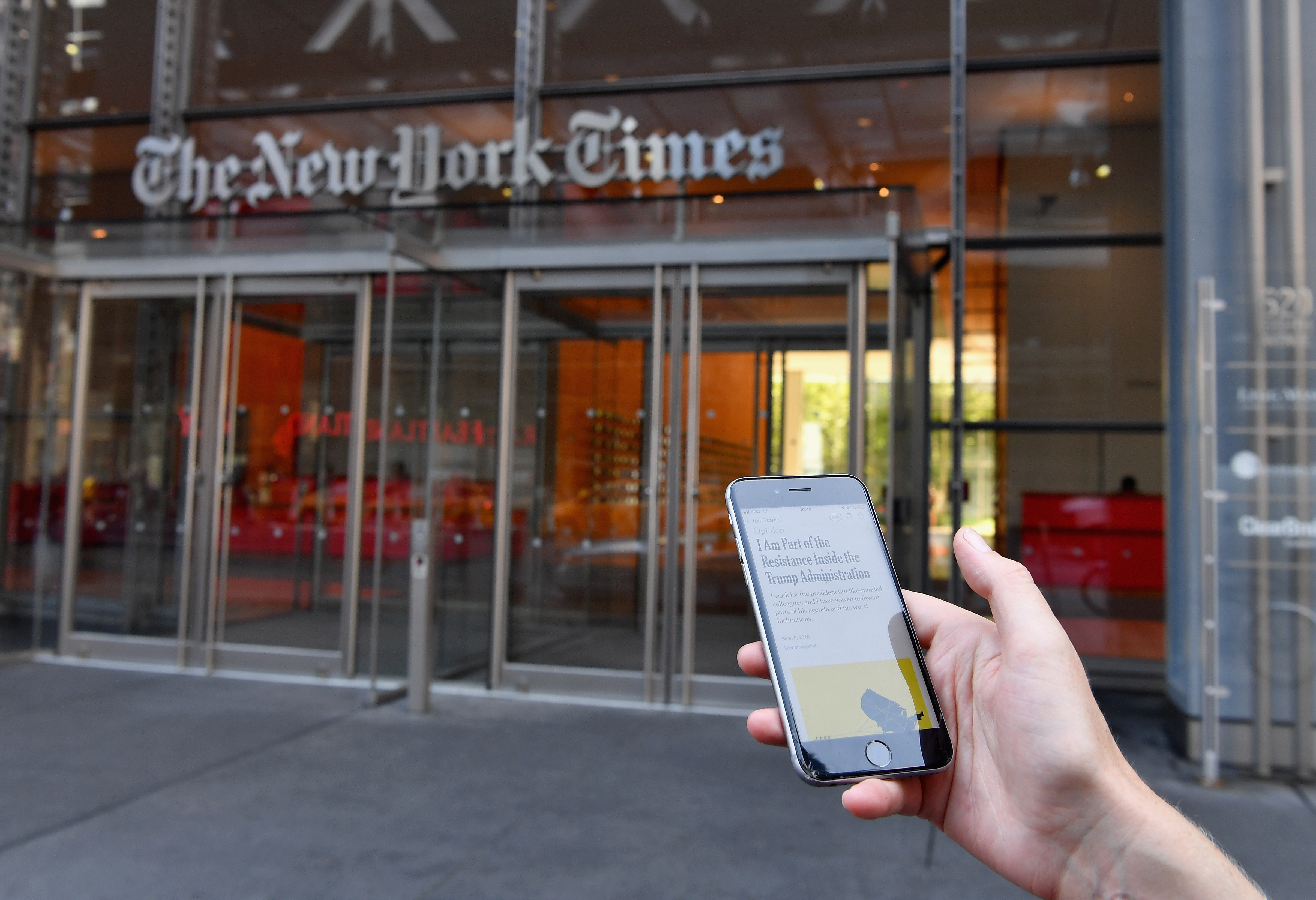Anonymous NYT op-ed against Trump spurs ethics debate
A smartphone displaying a New York Times opinion piece titled “I Am Part of the Resistance Inside the Trump Administration” is held up in front of the New York Times building (ANGELA WEISS)
New York (AFP) – The New York Times’s decision to publish an anonymous column from a White House insider has set off not only a political firestorm and infuriated President Donald Trump, but spurred debate over media ethics.
Since the nearly 1,000 word article went live on the website of America’s most prestigious newspaper on Wednesday afternoon, it has provoked more than 11,000 comments on the Times’s site and generated tens of thousands of tweets.
Headlined “I Am Part of the Resistance Inside the Trump Administration,” the author was identified only as a “senior administration official” and while an anonymous column is not unprecedented, it is extremely rare.
As the Times tells it, an intermediary approached op-ed editor Jim Dao a week ago saying that someone in the administration wanted to write the piece.
Dao agreed to take a look. When the piece landed, he told the Times’s own The Daily podcast that he was impressed with the clarity of the writing and its emotional impact.
He did some background checking, verified that the writer was who they purported to be and the paper published, to the immediate fury of Trump.
“The newsroom grants anonymity to sources on stories when they feel that those people are in danger, physical danger, of losing their livelihood. Our rules aren’t all that different in opinion,” Dao told The Daily.
“We don’t do these very often. I think this is maybe the fourth time we’ve done it in the last three years,” he said. “We decided that the piece was important enough and strong enough to justify granting anonymity.”
Nor, Dao said, was it a decision taken lightly.
“I was absolutely nervous about it for any number of reasons, one being the safety and security of the writer… One being the inevitable criticisms the Times op-ed page and the Times as an institution would face.”
– ‘Quagmire of weirdness’ –
But debate rages on both sides of America’s polarized political spectrum over whether the Times did the right thing.
Conservatives were adamant that they were wrong — leaping on yet another reason to chastise an outlet that Trump has accused of peddling “fake news.”
Sean Hannity, star presenter on Fox News — Trump’s favorite cable network — denounced the op-ed as “irresponsible” and “dangerously” published.
“The problem is we have no way of verifying this,” complained Derek Hunter on conservative website The Daily Caller. “Frankly the word of the New York Times is not worth taking.”
The Washington Post, the Times’s great rival, was sniffy. Its media columnist Margaret Sullivan, called the publication “a quagmire of weirdness: fraught with issues of journalistic ethics and possibly even legal concerns.”
What would happen, Sullivan wondered, if one of the Times’s own reporters discovered the identity of the author?
Writing in The New Yorker, Masha Gessen said the piece “added little to the public’s understanding of the administration,” and that by publishing it anonymously, the newspaper “forfeits the job of holding power to account.”
But David Greenberg, professor of history, journalism and media studies at Rutgers University, told AFP that the editorial had made an “amazing contribution” to public knowledge of the inner workings of the White House.
Coming on the heels of a new book by the journalist Bob Woodward, which paints an apocalyptic image of the Trump administration, makes it “very timely” and “helps focus the public conversation” on the appropriate role of government officials, Greenberg said.
Neither, he said, was the content groundbreaking, seeing parallels in the Republican administrations of both Richard Nixon and Ronald Reagan.
“It was well known that Reagan’s top aides often sought to kind of mitigate his worst instincts in that they tried to make sure it wasn’t as ideological a presidency in practice as Reagan often talked about in his rhetoric,” he said.
Disclaimer: This story has not been edited by Siliconeer and is published from a syndicated feed. Siliconeer does not assume any liability for the above story. Validity of the above story is for 7 Days from original date of publishing. Content copyright AFP.


